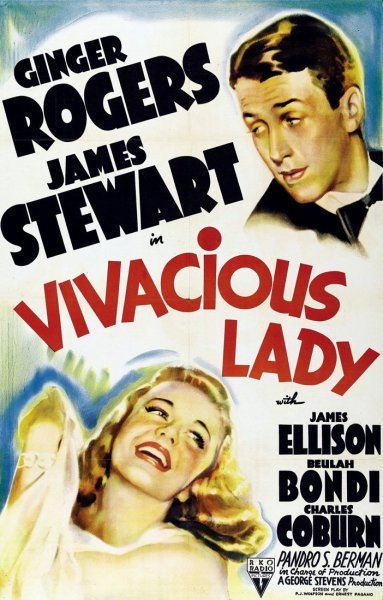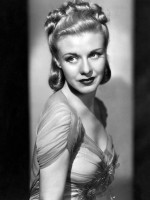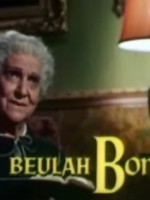Vivacious Lady is a american film of genre Comedy directed by George Stevens released in USA on 10 may 1938 with Ginger Rogers
Vivacious Lady (1938)

If you like this film, let us know!
- Infos
- Casting
- Technical infos
- Photos
- Videos
- Film quotes
- Characters
- Music
- Awards
Vivacious Lady is a 1938 American black-and-white romantic comedy film starring Ginger Rogers and James Stewart, produced and directed by George Stevens, and released by RKO Radio Pictures. The screenplay was written by P.J. Wolfson and Ernest Pagano and adapted from a short story by I. A. R. Wylie. The music score was by Roy Webb and the cinematography by Robert De Grasse.
The film features supporting performances by Frances Mercer, Beulah Bondi, Franklin Pangborn, and Charles Coburn, as well as an uncredited appearance by Hattie McDaniel.
Synopsis
Vivacious Lady is a story of love at first sight between a young botany professor named Peter Morgan Jr. (Stewart) and a nightclub singer named Francey (Rogers). The film also has comedic elements, including repeatedly frustrated attempts by the newlywed couple to find a moment alone with each other.Actors

Ginger Rogers
(Francey)

James Stewart
(Peter)

Beulah Bondi
(Mrs. Morgan)

Franklin Pangborn
(Apartment Manager)

James Ellison
(Keith)
Comments
Leave comment :
Suggestions of similar film to Vivacious Lady
There are 344 films with the same actors, 28 films with the same director, 49275 with the same cinematographic genres (including 2683 with exactly the same 3 genres than Vivacious Lady), to have finally 70 suggestions of similar films.If you liked Vivacious Lady, you will probably like those similar films :

The More the Merrier (1943)
, 1h44Directed by George Stevens, Budd Boetticher
Origin USA
Genres War, Comedy, Romantic comedy, Romance
Themes Political films
Actors Jean Arthur, Joel McCrea, Charles Coburn, Richard Gaines, Bruce Bennett, Frank Sully
Rating75%





During World War II, retired millionaire Benjamin Dingle (Charles Coburn) arrives in Washington, D.C. as an adviser on the housing shortage and finds that his hotel suite will not be available for two days. He sees an ad for a roommate and talks the reluctant young woman, Connie Milligan (Jean Arthur), into letting him sublet half of her apartment. Comedy ensues when the two clumsily get in each other's way while arising and preparing for work. Connie makes things work by keeping to an exacting schedule, including eating breakfast and leaving for work at precise times. Then Dingle runs into Sergeant Joe Carter (Joel McCrea), who has no place to stay while he waits to be shipped overseas. Dingle generously rents him half of his half.

On Our Merry Way (1948)
, 1h47Directed by John Huston, George Stevens, King Vidor, Leslie Fenton
Origin USA
Genres Comedy, Comedy-drama, Musical, Romance
Themes Films about music and musicians, Musical films
Actors Paulette Goddard, Burgess Meredith, James Stewart, Henry Fonda, Fred MacMurray, Dorothy Lamour
Rating57%





Oliver Pease, qui a menti à sa femme sur ce qu'il fait exactement au journal pour lequel il travaille, se voit obligé d'enquêter auprès du public sur "Quelle influence a eu un petit enfant sur votre vie ?". Il va recueillir ainsi différentes histoires...

Swing Time (1936)
, 1h43Directed by George Stevens
Origin USA
Genres Drama, Comedy, Musical, Romance
Themes Dance films, Films about music and musicians, Musical films
Actors Fred Astaire, Ginger Rogers, Victor Moore, Eric Blore, Helen Broderick, Frank Jenks
Rating74%





John "Lucky" Garnett (Fred Astaire) is a gambler and dancer. He is set to marry Margaret (Betty Furness), but his friends hold him up so that he is late for the wedding. Margaret's father phones to call off the wedding, but Lucky doesn't get that message. His friends bet him that he won't be getting married and he agrees to the bet. Margaret's father tells Lucky that he must earn $25,000 in order to demonstrate his good intentions.

Penny Serenade (1941)
, 1h59Directed by George Stevens
Origin USA
Genres Drama, Melodrama, Romance
Themes Films about adoption, Films about children, Films about families, Seafaring films, Transport films
Actors Irene Dunne, Cary Grant, Beulah Bondi, Edgar Buchanan, Ann Doran, Leonard Willey
Rating69%





Applejack Carney pulls from a shelf an album of records entitled "The Story of a Happy Marriage" and places the song "You Were Meant for Me" on the Victrola. Julie Adams, Applejack's old friend and owner of the album, asks him to turn off the tune and announces that she is leaving her husband Roger. After glancing at the nursery, Julie restarts the song and remembers meeting Roger years earlier: The same ballad is playing over the loudspeakers at the San Francisco music store where Julie works. When the record begins to skip, passerby Roger Adams enters the store and meets Julie. The two begin to date, and while at the beach one day, Julie breaks open a fortune cookie, which reads "you will get your wish --a baby." Roger, a confirmed bachelor who has no patience with children, hides his fortune, which predicts a "wedding soon," and replaces it with "you will always be a bachelor." Roger, a reporter, changes his mind, however, when he bursts into a New Year's Eve party with the news that his paper is assigning him to a post in Japan and asks Julie to marry him that evening. Knowing that they will not see each other for three months until Roger can earn enough money for Julie's passage to Japan, the newlyweds kiss goodbye in Roger's train compartment. As they embrace, the train pulls out, and as a result, Julie stays in Roger's compartment until the train stops the next morning. Three months later, when Julie is reunited with Roger in Japan, she reports that she is pregnant. Julie becomes concerned for the future of her family when she learns that Roger has lavishly furnished their house by spending advances on his salary. Later, when Roger inherits a small sum of money and announces that he has quit his job so that they can travel the world, Julie, disturbed by her husband's financial irresponsibility, goes upstairs to pack. At that moment, a violent earthquake strikes, demolishing the house and causing Julie to lose the baby. Roger and Julie return to San Francisco, and while hospitalized there, Julie learns that she will never be able to have children. Roger tries to console her by telling her that he wants to settle down and buy a small town paper, but Julie responds that a baby is all she ever wanted. Soon after, Roger buys the Rosalia Courier Press , and the couple moves into the apartment above the newspaper office, which is equipped with a small nursery. Roger hires their friend Applejack to manage the paper, but despite their hard work, circulation remains low. Two years later, while Roger is working late one night, Applejack encourages Julie to adopt a child, and when Roger returns home, Applejack prods him into agreeing to consider adoption. When Julie writes to the orphanage to request a two-year-old boy with curly hair and blue eyes, Mrs. Oliver, the administrator, interviews the prospective parents and later pays a surprise visit to their home. At first disapproving because the Adams house is a cluttered mess, Mrs. Oliver is charmed by the little nursery and tells Julie that a five-week-old baby girl is available for adoption. When Julie and Roger protest that they wanted a two-year-old boy, the age their own baby would have been, Mrs. Oliver assures them that this is the child for them. Roger and Julie consent to see the infant, and when Julie falls in love with the baby, Mrs. Oliver allows them to take her home for a one-year probation period. One year later, as the time for the adoption hearing approaches, Mrs. Oliver visits the family to update her records. When Julie admits that the paper has gone out of business and that Roger has no income, Mrs. Oliver solemnly caps her pen. Steeling themselves to return their baby, whom they have named Trina, to the orphanage, Roger bundles up the infant and proceeds to the judge's chambers. When the judge denies the adoption, Roger, near tears, begs to keep the little girl, pleading that she is like his own child. Moved by Roger's plea, the judge relents and grants the adoption, prompting Julie cheerily to proclaim that nothing can take Trina from them now. Years pass, and Trina's proud parents watch their daughter sing the echo to "Silent Night" in her school's Christmas play. When Trina slips on a platform while onstage, she worries that she will not be allowed to play an angel in the play the following year. The next Christmas, Mrs. Oliver receives a tragic letter from Julie, notifying her of Trina's death after a sudden, brief illness. Julie confides that Roger is punishing himself for Trina's fate and behaves like a stranger to her. At the Adams home, as Julie and Roger sit wordlessly in their living room, they hear a knock at the door. Julie answers it and finds a mother, frantic because her car is stalled and her son is due to perform in the school play. Julie and Roger offer to drive the mother and child to the play, and when the car arrives to the sound of children singing "Silent Night," Roger gets out and proclaims that he never again wants to see anybody or anything that reminds him of Trina. Julie's thoughts return to the present, and she takes the record off the turntable just as Applejack climbs the stairs to deliver her train ticket. At that moment, Roger returns, despondent, but as he picks up Julie's suitcase to drive her to the train station, the phone rings. It is Mrs. Oliver, calling to offer the couple a two-year-old boy, who is the image of the youngster they requested years earlier. Their faith and hope restored, Julie and Roger begin planning a new life with their son.

Bachelor Bait (1934)
Directed by George Stevens
Origin USA
Genres Comedy, Romantic comedy, Romance
Actors Stuart Erwin, Anne Shirley, Rochelle Hudson, Berton Churchill, Pert Kelton, Edgar Kennedy
Rating60%






Woman of the Year (1942)
, 1h54Directed by George Stevens
Origin USA
Genres Drama, Comedy, Romantic comedy, Romance
Themes Films about writers, Films about journalists, Films about marriage
Actors Spencer Tracy, Katharine Hepburn, Fay Bainter, Reginald Owen, William Bendix, Minor Watson
Rating70%





Tess Harding (Katharine Hepburn) and Sam Craig (Spencer Tracy) are journalists for the fictional New York Chronicle, with two drastically different backgrounds and worlds. Tess is an educated, well-travelled political affairs columnist who speaks several languages fluently. Sam is a knowledgeable and informed sports writer. Their difficulties are presented as stemming from class and emotional differences as well as from those of gender.

The Talk of the Town (1942)
, 1h58Directed by George Stevens, Earl Bellamy
Origin USA
Genres Drama, Thriller, Comedy, Comedy-drama, Romantic comedy, Romance
Actors Cary Grant, Jean Arthur, Ronald Colman, Rex Ingram, Edgar Buchanan, Charles Dingle
Rating74%





Mill worker and political activist Leopold Dilg (Cary Grant) is accused of burning down a mill and causing the death of a foreman in the fire. In the middle of his trial, Dilg escapes from jail and seeks shelter in a house owned by former schoolmate Nora Shelley (Jean Arthur), now a schoolteacher on whom he has had a crush for years. Shelley has the house rented for the summer to distinguished law professor Michael Lightcap (Ronald Colman), who plans to write a book. Both Lightcap and Dilg arrive within minutes of each other.

The Diary of Anne Frank (1959)
, 2h55Directed by Nina Foch, George Stevens, David S. Hall
Origin USA
Genres Drama, Biography, Comedy, Historical, Romance
Themes Films about religion, Théâtre, Political films, Films about Jews and Judaism, Films based on plays, Children's films
Actors Douglas Spencer, Millie Perkins, Lou Jacobi, Joseph Schildkraut, Shelley Winters, Richard Beymer
Rating73%





In 1945, as a truckload of war survivors stops in front of an Amsterdam factory at the end of World War II, Otto Frank (Joseph Schildkraut) gets out and walks inside. After climbing the stairs to a deserted garret, Otto finds a girl's discarded glove and sobs, then is joined and comforted by Miep Gies (Dodie Heath) and Mr. Kraler (Douglas Spencer), factory workers who shielded him from the Nazis. After stating that he is now all alone, Otto begins to search for the diary written by his youngest daughter, Anne. Miep promptly retrieves the journal for Otto, and he receives solace reading the words written by his young daughter three years earlier.

The Only Game in Town (1970)
, 1h53Directed by George Stevens
Origin USA
Genres Drama, Comedy, Romance
Themes Films based on plays, Children's films
Actors Elizabeth Taylor, Warren Beatty, Hank Henry, Olga Valery
Rating57%





Aging Las Vegas chorine Fran Walker (Taylor) drifts into an affair with lounge pianist and compulsive gambler Joe Grady (Beatty) while waiting for her married lover, San Francisco businessman Thomas Lockwood, to finalize the divorce he has been promising to get for the past five years.

A Damsel in Distress (1937)
, 1h38Directed by George Stevens
Origin USA
Genres Comedy, Musical theatre, Musical, Romance
Themes Dance films, Films about music and musicians, Films about classical music and musicians, Jazz films, Musical films
Actors Fred Astaire, George Burns, Gracie Allen, Joan Fontaine, Reginald Gardiner, Constance Collier
Rating67%





Everyone on staff at Tottney Castle knows that the lovely Lady Alyce Marshmorton must marry soon, so a wager is proposed as to the identity of the lucky man. With all the likely candidates already claimed, young footman Albert places a bet on a "Mr. X," someone totally out of the blue.
 Connection
Connection